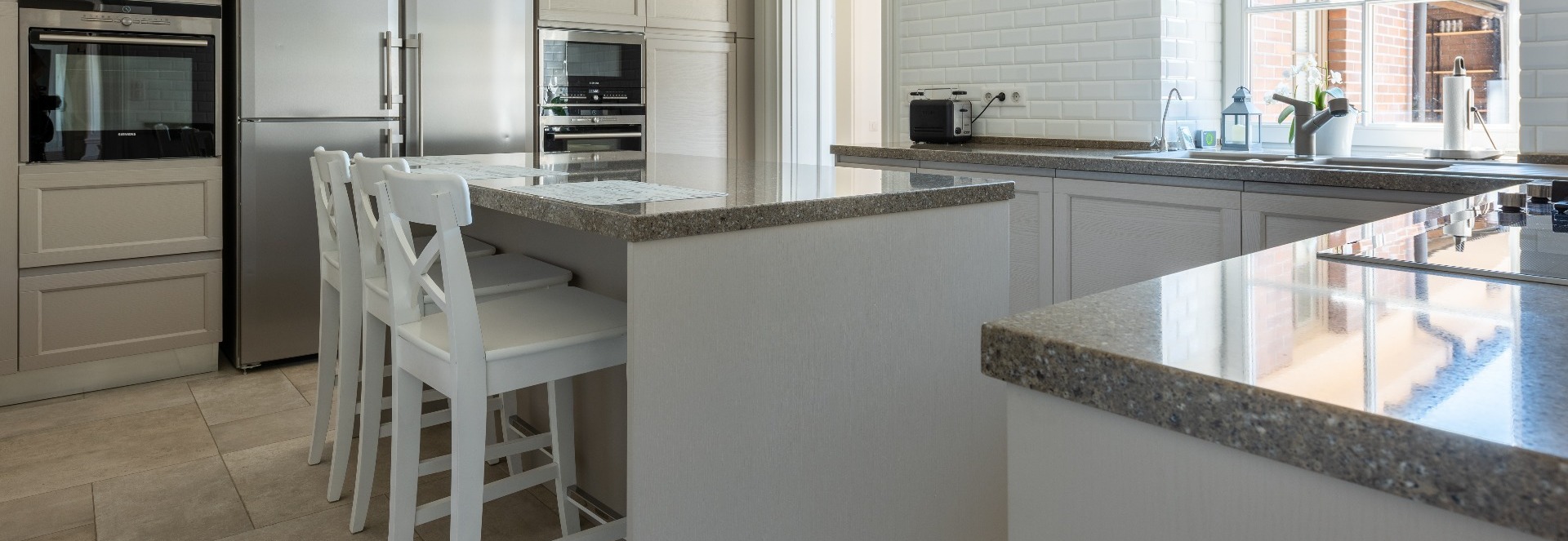What Are the Best Granite Worktop Maintenance Tips?
Posted on 2nd February 2022 at 09:00
Having a granite worktop maintenance routine is important. A natural stone worktop like granite, natural quartzite, or marble is extremely durable and strong, but they are not indestructible. Without sealing your countertop and some light maintenance, your worktop is susceptible to staining.
In this post, we are going to offer some guidance on the care and maintenance of granite worktops. By following these tips, you can retain your granite worktops' original beauty and shine.
Granite Worktop Maintenance: Why Does Granite Need to Be Maintained?
Light granite worktop maintenance is important, but many people may fail to realise why. Granite is porous, which means it contains small holes capable of absorbing liquid and air. Maintenance needs to be implemented for this reason. We spend a lot of time in our kitchens, and our countertops come in contact with a lot of materials and ingredients. Not only this, but our countertops may be exposed to hot and cold objects, leading to the cross-contamination of bad bacteria.
The information online about sealing is conflicting. Whilst some people say sealing is absolutely necessary, others say it is not. It is known that granite is extremely durable, and is capable of fending off stains and damage. After all, granite countertops are made from natural stone and have a lifespan of over 100 years. However, many manufacturers still advise homeowners to seal their granite countertops. This is usually a precautionary measure, but will, of course, help owners of granite work surfaces to retain its original condition.
Another topic which is often debated is how often sealing needs to be done. Whilst some people suggest it needs to be completed every 6 months, there are others who say once every 3 years is fine. The frequency of your sealment treatment will depend on the absorbency and porosity of your particular countertop. For example, a lighter stone will need to be sealed more frequently.
If you are unsure about any aspects of granite maintenance, you can contact a member of our expert team. When it comes to sealing your work surface, this should be assessed carefully and not done thoughtlessly. All granite countertops are different, so we encourage you to enlist the help of one of our professionals. They will be able to tell you if you need to seal your surface, and how often you should look to do so. Not only this, but they can offer a more thorough insight into the care and maintenance of granite worktops.

Tips For Care and Maintenance of Granite Worktops
So, what exactly are the best granite worktop maintenance tips? In order to keep those countertops shining and gleaming, it is encouraged that you create a plan that incorporates some basic care and maintenance ideas. Granite is strong, withstanding a lot. If you want to keep it in pristine condition however, it will need to be looked after and cared for with some light maintenance, such as:

As Suggested, Keep Granite Sealed
This was discussed earlier in the post, but establishing if you need to seal your granite and how often is important. A sealment treatment will make your countertop less susceptible to staining and help to keep it in great condition. Some granite countertops absorb more than others, and the colour and density of the granite will make a significant difference. It is always best to get a second opinion on whether your granite needs sealing. Someone with experience in natural stonework surfaces will be able to assess yours, and give you key advice based on their assessment.

Have An Everyday Cleaning Routine
Reassuringly, granite worktop maintenance is quite simple. Granite worktops are low maintenance, and really do not need a lot of attention. Although they do often come with a hefty price tag attached, we believe the little maintenance work required makes up for it.
A microfibre cloth and some warm water should be enough to keep your countertops clean on a daily basis. Daily use of your worktops will result in smears. By using your microfibre cloth and your warm water, you should be able to easily eradicate these smears. If you have any marks, we recommend using a pH neutral cleaning solution in addition to your damp cloth. You can then buffer with another cloth, which will help clear any water spots or streaks.


Perform a Weekly Deep-Clean
As well as your brief daily clean, it is a good idea to deep-clean your surfaces once a week. As we stated before, if you are using any cleaning solutions, we recommend you use a pH neutral solution. This will accurately lift marks whilst being kinder to your granite. If the aim is to disinfect your surfaces, a mixture of isopropyl alcohol and distilled water in a spray bottle will solve the problem.

Avoid Placing Hot Pans On Your Countertops
If you have made an effort with granite worktop maintenance, you need not worry about heat coming in contact with your countertop. Granite is strong, and is able to resist most hot objects. However, most manufacturers do advise that you place any hot pans on a mat. Although a hot pan is unlikely to blister or melt your countertop, it may cause discoloration if the granite is repeatedly exposed.
Granite Unlimited: Care and Maintenance of Granite Worktops
In this article, we expanded on the information available on our Care and Maintenance page. A freshly installed granite countertop is a thing of beauty and will be admired by guests for years to come. Following the simple tips laid out in the article will ensure your worktop remains in pristine condition, and remains the focal point of your kitchen.
We have a wide range of granite worktops, and our expert technicians can service a number of locations across the country, including Essex, Chelmsford, Southend, Cambridge, and Ipswich. For more information about our stock, visit our dedicated Granite Worktops page.
Share this post:


